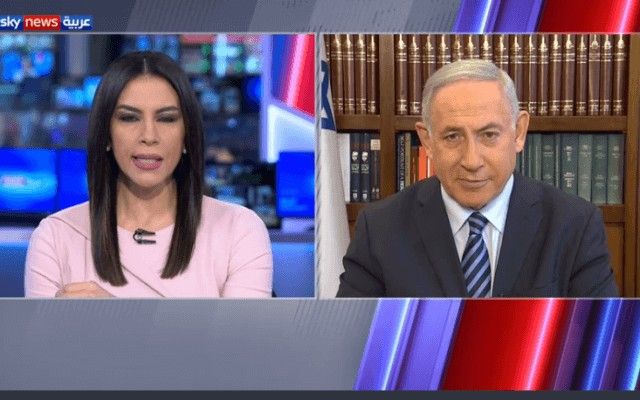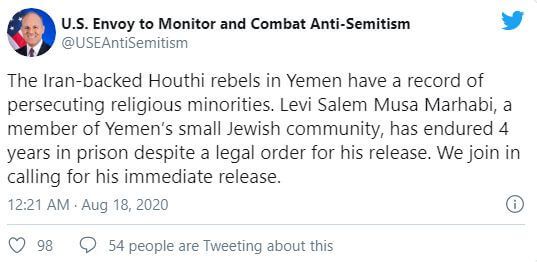| 1 |
Just days after the announcement of a normalization agreement between Israel and the United Arab Emirates, Prime Minister Benjamin Netanyahu gave an unprecedented interview to Abu Dhabi-based Sky News Arabia. He stressed that both countries would benefit “greatly from the deal,” while expressing confidence that other Arab states would follow suit.
Regarding Israel’s proposed application of sovereignty to parts of the West Bank, Netanyahu revealed that the Trump administration had asked him to suspend the move temporarily as the top priority for now was formalizing similar accords with other regional nations. In this respect, Netanyahu expressed confidence that other Arab states — reportedly including Bahrain, Oman, Sudan and Morocco — would quickly follow suit.
Hailing the move as a game changer in Middle East peace-making, Netanyahu predicted that the accord would eventually lead to peace with the Palestinians.
Netanyahu spoke in English but the interview was simultaneously translated into Arabic.

Meanwhile, President Reuven Rivlin praised Emirati Crown Prince Mohammed bin Zayed Al Nahyan for his “noble and courageous” actions, and invited the de facto UAE leader to visit Jerusalem. “In these fateful days, leadership is measured by its…ability to be groundbreaking and far-sighted,” Rivlin wrote in a letter to the ruler of Abu Dhabi.
| 2 |
Top White House adviser Jared Kushner has slammed the Palestinian Authority over its total and complete rejection of the US-mediated peace agreement between Israel and the United Arab Emirates.
“We’re not going to chase the Palestinian leadership,” Kushner said. “Their credibility is just really falling to an all-time low and even people who want to help the Palestinians, those people are just saying that you can’t help people who don’t want to help themselves.”
The PA condemned last week’s pact as a “betrayal” of its cause and, on Monday, announced that it would boycott next year’s world fair in Dubai .
Kushner furthermore told reporters during a conference call that it would also be in Saudi Arabia’s interest to normalize ties with Israel, as doing so would weaken Iran’s influence in the region and ultimately facilitate the resumption of peace negotiations with the Palestinians.
“It would be very good for Saudi business, it would very good for Saudi’s defense [industry], and, quite frankly, I think it would also help the Palestinian people,” Kushner contended.
| 3 |
Hamas reportedly told Egyptian mediators visiting the Gaza Strip that violence along the border with Israel would continue unless the terrorist group’s demands were met. Hamas officials were cited as saying to the Egyptian delegation that, “Palestinian patience has run out.”
Hamas said that a 2018 loosely-defined cease-fire agreement with Israel included a commitment on the latter’s part to expand Gaza’s fishing zone to 20 nautical miles; construct a new power line to the coastal enclave using Qatari financing; convert Gaza’s power plant so that it runs on natural gas; and allow more Gazans to receive Israeli work permits.
The urgent visit by the Egyptians comes amid growing hostilities along the Israel-Gaza border following months of relative calm.
For the past week, explosive-laden balloons launched from Gaza have set swaths of Israeli agricultural land ablaze. In response, the IDF has on numerous occasions struck Hamas military assets.
| 4 |
Antisemitism Watch: Holocaust denial content is “readily accessible” on social media and Facebook algorithms “actively” promote it, according to a report published this week. The London-based Institute for Strategic Dialogue found that typing the word “Holocaust” into Facebook’s search function led users to accounts dedicated to the denial of the Nazi genocide. The report also analyzes how content moderation policies can be effective in removing from the platform anti-Jewish conspiracy theorists.
Meanwhile, Elan Carr, the US special envoy to monitor and combat antisemitism, has urged Iranian-backed Houthi rebels to release an illegally imprisoned member of Yemen’s tiny Jewish community:

The Houthis in late 2014 captured Yemen’s capital and ousted the internationally recognized government, prompting a Saudi-led coalition of Sunni regional countries to intervene militarily in the conflict.
The Houthis’ official slogan is “Allah is Greater, Death to America, Death to Israel, Curse on the Jews, Victory to Islam.”
| 5 |
Rami Levy, who is best known for his chain of supermarkets that promote Israeli-Palestinian reconciliation, has sued the United Nations Human Rights Council (UNHRC) over its blacklisting of companies operating in territories Israel captured during the Six Day War.
In February, the UNHRC released its “settlement blacklist” that charged over 100 companies operating in the West Bank, including the eastern section of Jerusalem and the Golan Heights, with violating international law. The move was meant to pressure businesses – the majority of them Israeli-owned but which also have connections to US and European corporations – to shut down their operations in these disputed territories.
“I believe in true coexistence,” said Levy. “All of our employees at our stores are hired without distinction on the basis of religion, race, or nationality — in an equal fashion.”
| 6 |
Tom Meyer, a professor of theology at California’s Shasta Bible College and Graduate School, believes there is ample archaeological evidence that validates the Biblical account of the fabled Siloam Tunnel in Jerusalem. He claims that an ancient Hebrew inscription found inside the tunnel sheds light on its construction.
“The inscription is significant not only because it validates the Biblical account,” he said, “but because it is the only inscription from ancient Israel that commemorates a public works program and is one of the oldest examples of Hebrew writing.”
The Siloam Tunnel, also known as Hezekiah’s Tunnel, is an ancient waterway carved under Jerusalem some 2,700 years ago. It ran under the City of David, funneling freshwater into Jerusalem from Gihon Spring, located outside of the Old City’s walls. Mention of the tunnel is found in the Old Testament’s 2 Kings 20:20, which says that the tunnel wasbuilt on the order of Hezekiah.
Recommended Content
Israel-UAE Peace Deal: What’s Next for the Palestinians? (VIDEO)
- How ancient coins and seals prove the Jewish connection to Jerusalem (Dov Lipman, HonestReporting)
- Special Court convicts 1 of 5 Hezbollah members of killing ex-Lebanese PM (Yonah Jeremy Bob, Jerusalem Post)
- Has Bibi given up Israel’s military edge for normalization with the UAE? (Anna Ahronheim, Jerusalem Post)
- Iran should not celebrate UN Security Council’s arms embargo vote (Michael Pregent, Arab News)
- Why Israel looks different to some Arab leaders (Christian Science Monitor, Editorial Board)
- Does it matter if Democratic Socialists don’t want Jews in Israel? (Jonathan S. Tobin, JNS)
- Check out Israel’s 10 most unusual wild animals (Naama Barak, Israel21c)

